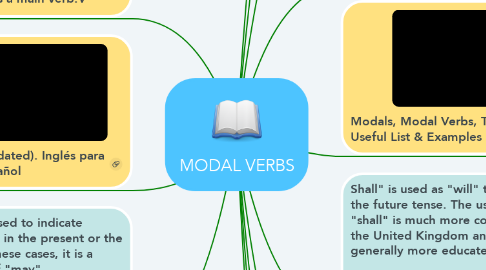MODAL VERBS
by Heazel Portillo

1. Modal verbs are auxiliary verbs that can not function as a main verb, unlike the auxiliary verbs "be", "do" and "have" that can function as a main verb.V
2. Modal Verbs (Updated). Inglés para hablantes de español
3. Modals, Modal Verbs, Types of Modal Verbs: Useful List & Examples | English Grammar
4. Shall" is used as "will" to form the future tense. The use of "shall" is much more common in the United Kingdom and is generally more educated. Example: Chris shall be happy to see you
5. "Should" is used in interrogative phrases to ask if there is an obligation or to ask for a recommendation. Example: Should we leave a tip
6. Ought to" is a synonym of "should" although it is less common. Example: She ought to quit smoking
7. Also the use of "will" means will or determination. Example: I will help you
8. "Would" is used to declare a preference and to ask for something politely. Example: She would like to go to New York someday
9. Can "indicates ability or possibility. In these cases it can be translated as "power" in Spanish. Example: We can work late tonight if you need us.
10. "Could" indicates possibility or ability in the past. Example: Joe could speak Spanish when he was young.
11. As "could", "may" is used to indicate possibilities in the future. Example: I would bring an umbrella, it may rain later.
12. Might" is used to indicate possibilities in the present or the future. In these cases, it is a synonym of "may". Example: I would bring an umbrella, it might rain later
13. Must "indicates an obligation, prohibition or necessity. You can also use "have to" in affirmative sentences. Example: You must [have to] read this book, it's fantastic.


